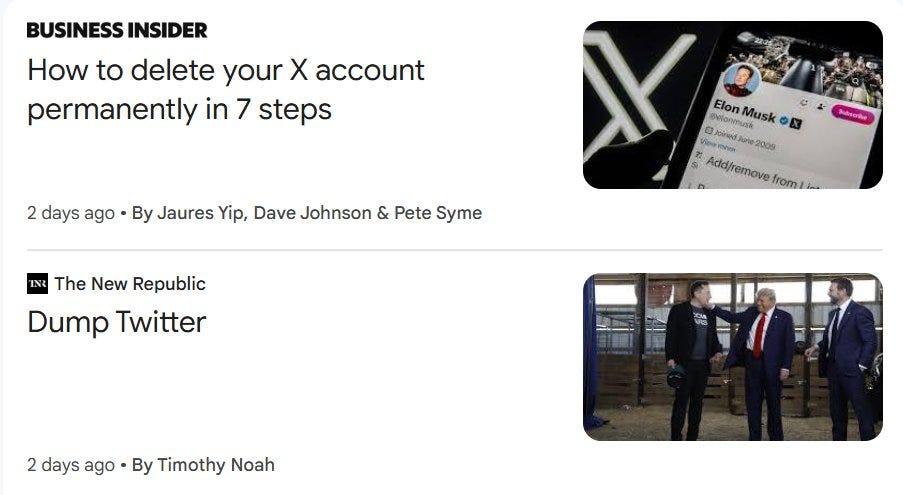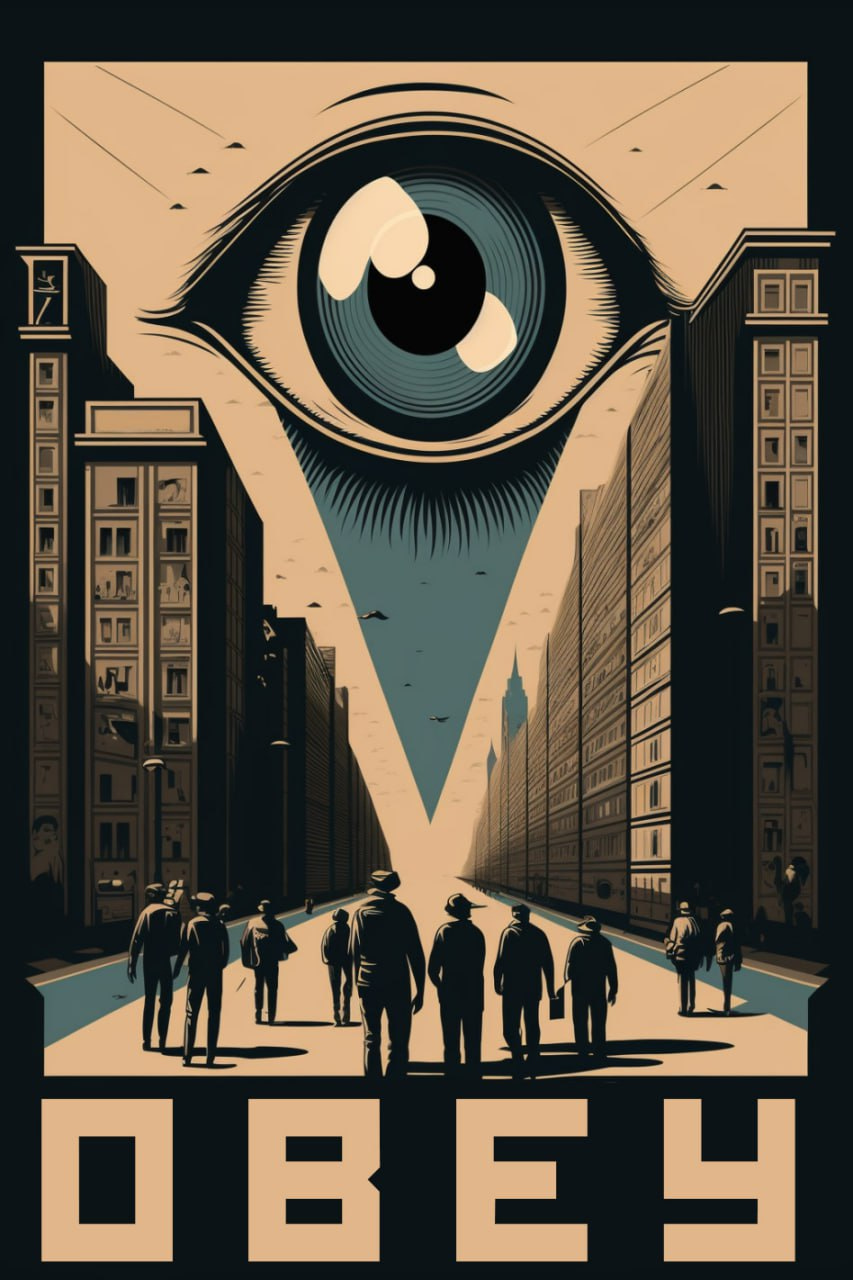Trad media now openly hates the internet
They want you to stop talking, stop thinking for yourself, and go back to being a good little passive consumer of information
Quick intro: since the forum days of the 90s, I figured we’d reach this point. Tech companies and media are in a constant battle for attention/distribution, and the fight is getting real: the multi-decade attention cold war has turned hot. We can only hope everyone finds a more amicable state, but that may take time. And of course not every journalist is against a free and open internet, and, tech aren’t always the good guys, either. The situation is complex. You’re going to have to navigate a lot for yourself.
Traditional media's relationship with the internet has grown increasingly antagonistic since the start of the pandemic and reached something of a crescendo last week. In many ways legacy media outlets, the self-appointed guardians of truth, have turned the open landscape of the internet into a battleground. They appear to be waging war on the very essence of the internet: communities formed organically, ideas shared freely, and knowledge networks unshackled from centralized authority. They seem to badly wish for popular spaces with ideas they do not agree with (or have little control over) to go away. We’ve even seen open disdain for our first amendment rights in America, which should be deeply concerning for all Americans. People in the UK have been jailed for honestly milquetoast Facebook posts. Again, if you’re not concerned yet, you should be.
The institutional hostility and anger is more than merely a reaction to the seismic shifts in media consumption, it’s a direct assault on the freedoms we take for granted. All while media organizations themselves are engaged in a subprime attention bubble. The hypocrisy is palpable.
Traditional media’s antagonism toward the internet frequently manifests as calls for stricter controls, censorship, or restrictions on content creation, all framed as necessary measures to protect the public from harm. Scandals related to online privacy and data use are often seized upon as cautionary tales, not just against data abuse but against online interaction itself. Rather than encouraging media literacy or advocating for user empowerment, traditional media pushes for a more regulated, unsocial internet, implicitly suggesting that the public should rely solely on trustworthy sources — their sources. This approach is designed to dissuade active participation in online communities reinforcing a view of the internet as a murky space best left to passive, read-only consumption on ‘state-approved’ websites. Websites they don’t approve of, are of course bad, and they brand them as places to avoid, filled with spam, bots, “misinformation” or simply takes they don’t like (meanwhile, anyone who is reasonably competent can and does curate a useful experience on). They basically hate the internet.

There is great irony in some other recent stories (we won’t be linking such things) where the media tried to use the specter of “Nazis” to shame us into not posting to Twitter specifically, a website they do not understand. As a Jewish person who is part of a vibrant community of other fellow Jews on that site, I find this one incredible, and honestly feel gaslit. In the post-October 7th landscape, Twitter was the only place online actually pushing back against astroturfed news and narratives attempting to get the public to side with terrorist organizations slaughtering and harassing Jews, even in Western countries. Tweets helped lead to (and were referenced in) congressional hearings where ivy league administrators were brought to be questioned about accountability of protecting Jewish students. It goes beyond gaslighting, which it is, it’s all a gross misunderstanding of social media. They also conveniently ignore there are many more worse actors on larger networks like Instagram, it’s just that one is beyond critique (and also, without something like a community notes feature the Jewish hate there is actually far more unchecked). If you were a Jewish person on Twitter you would see people documenting these things (oddly, much of the media doesn’t want us doing this as witnessed above…could we conclude they want the antisemites to reign free, without consequence?).
Any website users contribute to with 100s of millions of participants has ideas we might not like. This is simply how the internet functions. We of course do not have to agree with all of them, but participation does not imply endorsement. Just like we don’t agree with everyone in a country we live in (the internet is really no different than this, at the scales presented). This is eerily similar to how we were all status-shamed for not agreeing with other authoritarian and even religious ideologies in the past. We need to stand up to this bullying.
At the same time, there’s another subtler pattern in the way traditional media has repeatedly misconstrued or misrepresented online phenomena. Whether it’s dismissing online activism as “slacktivism” or downplaying the educational potential of social media, there is a tendency to position the internet as inherently trivial, rarely any longer as positive change and empowerment. Institutionalists dismissed tech companies as overvalued, the internet currencies as completely useless and immediate zeros (Bitcoin currently trades >80K, that this will fluctuate isn’t the point), AI as fake, the cloud as a bubble, you get the idea. The obvious irony here is that traditional media, by clinging to its narrative monopoly and resisting change missed not only the big trends, but the subtle cultural and political forces brewing online. And in misunderstanding or intentionally misrepresenting these forces, they have alienated an audience that no longer sees itself merely as a passive consumer but as a participant in shaping culture. This actually runs counter to the previous paragraph, but media have just taken whatever shots they can take over the years for clicks and attention …their narratives are not cohesive, simply “tech bad.”

Traditional media’s existential threat here isn’t even misinformation or lack of regulation of the internet, it’s the prospect of losing control over public discourse (go listen to their crazed talking heads instead). A populace that can organize, educate itself, and exchange ideas independently of major news outlets presents a threat to the old media gatekeeping model. This isn’t a debate about ‘fake news’ or internet privacy. It’s about who has the right to determine what information is valid, what voices are heard, and who gets to participate in the conversations shaping society.

The internet, in its best form, is a commons: a place where anyone can publish, anyone can respond, and anyone can learn. The open, interactive nature of this digital space threatens traditional media’s closed systems of controlled discourse and distribution but only if their reporting is purposefully antagonistic or ideologically captured. By constantly framing internet platforms negatively because they do not do as they’re told, traditional media subtly pushes an agenda against the internet's potential as a forum for free, unrestricted exchange. Nevermind that in reality, for any media entities doing their jobs well, the internet is their largest ally (in building their brands, attention and trust).
This isn’t to deny the problems of things like false AI generated imagery and data abuse, they’re real issues requiring thoughtful solutions. But let’s be clear: traditional media’s insistence on turning the internet into a sterile, read-only environment is not about our safety or our knowledge, it’s about their relevance and control. These stories bother me as this hostility represents a fundamental opposition to our core freedoms of speech, of association, of community, that the internet provides. Open communities online function closest to the real world markets: the more we control them, the more they simply become information bubbles (and we just saw who actually lives in a bubble). A healthy community surfaces the truth, which we might not always like. I’ve talked about the fact that I think we live in a pain-avoidant society before. I think this is just another manifestation of this. Sticking our heads in the sand about things we don’t like is always worse.
So don’t be gaslit. If you find value in a tool with 100s of millions of users, that’s a statistically relevant portion of the population and basically an entire country. Being part of such a community is great. Of course there’s some bad actors, but we share Earth with them. We need to work together and bring them to a more centrist and sane position. But the internet is not a safe space. In a way, everyone constantly seeking a safe and reclusive position is a reason for many of our problems in society.
We should be truth seeking, not trying to simply cancel people or websites we disagree with.





Thank you for writing this post. I want to hear different voices even if I disagree with them. I can always use the mute/block buttons to filter out the noise. Wish Twitter would expand these features instead of rolling them back, Threads has been excellent on this front.
Great post. 2 more examples of Twitter providing me information that the legacy media either doesn’t or waits way too long:
- Trump’s first assasination attempt: I think we all remember the “Secret Service rushes Trump off stage after he falls at rally” CNN headline. It’s on Twitter that I first understood someone had tried to kill him and almost succeeded.
- Last week’s attacks on Jews in Amsterdam: the legacy media (AP and WaPo) didn’t provide any description of the attackers during the first 24 hours. Meanwhile, following Bill Ackman, it was clear who they were.